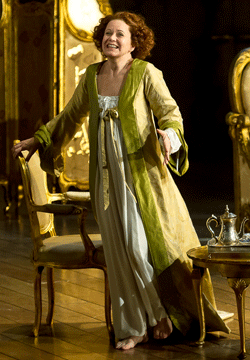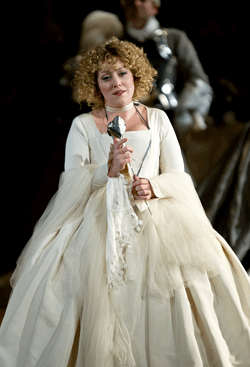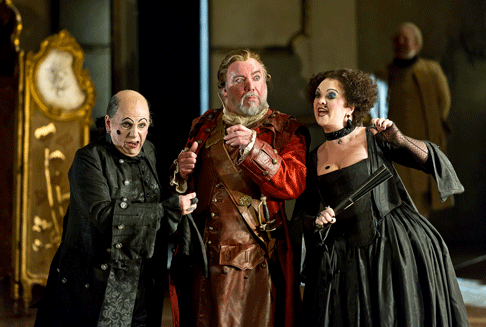![Sarah Connolly as Octavian [Photo by Clive Barda courtesy of English National Opera]](http://www.operatoday.com/Rosenkavalier_ENO_2012_3.gif)
08 Feb 2012
Der Rosenkavalier, ENO
English National Opera’s revival of Richard Strauss’s fin de siècle Figaro is a heart-warming treat for a cold winter’s night.
English Touring Opera are delighted to announce a season of lyric monodramas to tour nationally from October to December. The season features music for solo singer and piano by Argento, Britten, Tippett and Shostakovich with a bold and inventive approach to making opera during social distancing.
This tenth of ten Live from London concerts was in fact a recorded live performance from California. It was no less enjoyable for that, and it was also uplifting to learn that this wasn’t in fact the ‘last’ LfL event that we will be able to enjoy, courtesy of VOCES8 and their fellow vocal ensembles (more below …).
Ever since Wigmore Hall announced their superb series of autumn concerts, all streamed live and available free of charge, I’d been looking forward to this song recital by Ian Bostridge and Imogen Cooper.
Although Stile Antico’s programme article for their Live from London recital introduced their selection from the many treasures of the English Renaissance in the context of the theological debates and upheavals of the Tudor and Elizabethan years, their performance was more evocative of private chamber music than of public liturgy.
Evidently, face masks don’t stifle appreciative “Bravo!”s. And, reducing audience numbers doesn’t lower the volume of such acclamations. For, the audience at Wigmore Hall gave soprano Elizabeth Llewellyn and pianist Simon Lepper a greatly deserved warm reception and hearty response following this lunchtime recital of late-Romantic song.
For this week’s Live from London vocal recital we moved from the home of VOCES8, St Anne and St Agnes in the City of London, to Kings Place, where The Sixteen - who have been associate artists at the venue for some time - presented a programme of music and words bound together by the theme of ‘reflection’.
'Such is your divine Disposation that both you excellently understand, and royally entertaine the Exercise of Musicke.’
‘And there was war in heaven: Michael and his angels fought against the dragon; and the dragon fought and his angels, And prevailed not; neither was their place found any more in heaven … that old serpent … Satan, which deceiveth the whole world: he was cast out into the earth, and his angels were cast out with him.’
There was never any doubt that the fifth of the twelve Met Stars Live in Concert broadcasts was going to be a palpably intense and vivid event, as well as a musically stunning and theatrically enervating experience.
‘Love’ was the theme for this Live from London performance by Apollo5. Given the complexity and diversity of that human emotion, and Apollo5’s reputation for versatility and diverse repertoire, ranging from Renaissance choral music to jazz, from contemporary classical works to popular song, it was no surprise that their programme spanned 500 years and several musical styles.
The Academy of St Martin in the Fields have titled their autumn series of eight concerts - which are taking place at 5pm and 7.30pm on two Saturdays each month at their home venue in Trafalgar Square, and being filmed for streaming the following Thursday - ‘re:connect’.
The London Symphony Orchestra opened their Autumn 2020 season with a homage to Oliver Knussen, who died at the age of 66 in July 2018. The programme traced a national musical lineage through the twentieth century, from Britten to Knussen, on to Mark-Anthony Turnage, and entwining the LSO and Rattle too.
With the Live from London digital vocal festival entering the second half of the series, the festival’s host, VOCES8, returned to their home at St Annes and St Agnes in the City of London to present a sequence of ‘Choral Dances’ - vocal music inspired by dance, embracing diverse genres from the Renaissance madrigal to swing jazz.
Just a few unison string wriggles from the opening of Mozart’s overture to Le nozze di Figaro are enough to make any opera-lover perch on the edge of their seat, in excited anticipation of the drama in music to come, so there could be no other curtain-raiser for this Gala Concert at the Royal Opera House, the latest instalment from ‘their House’ to ‘our houses’.
"Before the ending of the day, creator of all things, we pray that, with your accustomed mercy, you may watch over us."
The doors at The Metropolitan Opera will not open to live audiences until 2021 at the earliest, and the likelihood of normal operatic life resuming in cities around the world looks but a distant dream at present. But, while we may not be invited from our homes into the opera house for some time yet, with its free daily screenings of past productions and its pay-per-view Met Stars Live in Concert series, the Met continues to bring opera into our homes.
Music-making at this year’s Grange Festival Opera may have fallen silent in June and July, but the country house and extensive grounds of The Grange provided an ideal setting for a weekend of twelve specially conceived ‘promenade’ performances encompassing music and dance.
There’s a “slide of harmony” and “all the bones leave your body at that moment and you collapse to the floor, it’s so extraordinary.”
“Music for a while, shall all your cares beguile.”
The hum of bees rising from myriad scented blooms; gentle strains of birdsong; the cheerful chatter of picnickers beside a still lake; decorous thwacks of leather on willow; song and music floating through the warm evening air.
![Sarah Connolly as Octavian [Photo by Clive Barda courtesy of English National Opera]](http://www.operatoday.com/Rosenkavalier_ENO_2012_3.gif)
English National Opera’s revival of Richard Strauss’s fin de siècle Figaro is a heart-warming treat for a cold winter’s night.
Director David McVicar’s self-designed staging perfectly balances detail and spaciousness — an accomplished feat and a productive one; although the score is complex and infinitely nuanced, McVicar has been able to identify which details to foreground visually and which to allow to reside in the musical foundations. So, there is finely judged attention to detail but the resulting drama is not fussy or cluttered.
 Amanda Roocroft as The Feldmarschallin
Amanda Roocroft as The Feldmarschallin
A single backdrop suffices: a curving Regency interior, slightly past its prime but still offering elegant evidence of the stylish sophistications of yesteryear — much like the Marschallin herself. Gilt and bronze drapes, curling creepers and cobwebbed chandeliers create a fairy-tale otherworldliness, and this is enhanced by Paule Constable’s clever lighting which, evoking subdued candlelight — the front of stage decked with row of crumbling candles (which Valzacchi snappily switches on at the start of the Mariendal scene) — establishes an ethereal distance. And, in the fading light of Act 1, a deepening, looming shadow of the Marschallin provides a visual echo of the ‘former’ self whose passing she laments.
McVicar’s direction judiciously mixes dense and intricate movements — as during the spooking of Ochs in the inn scene, when tumblers and goblins cavort and cartwheel wildly across the stage — with gentler gestures which flow as organically as Strauss’s score, particularly in the closing moments. The extremes of the wide stage are deployed to depict the emotional distance between characters; and at the close to emphasise the Marschallin’s isolation from the young lovers.
 Sophie Bevan as Sophie
Sophie Bevan as Sophie
John Tomlinson’s Baron Ochs of Lerchenau is a Falstaffian scally-wag, with all the bluff, swagger and ultimately forgivable self-interest of his Shakespearean predecessor. We may cringe at his hapless fumbling after any helpless female within arm’s reach; find his empty boasts and groundless vanity infuriating and his class-obsessed condescension distasteful. But, his candid self-knowledge and readiness to greet defeat with big-hearted generosity win our tolerance, tenderness and even, in the end, our pity. This is a comic turn par excellence, one which fortunately does not lapse into caricature; and, the humour is never achieved at the expense of musical control or accuracy. A master of crisp diction, Tomlinson’s every syllable is crystal clear. Weighty but flexible, his bright, gleaming tone is a joy, and it loses none of its gloss as he descends to the depths of his register. It may be a little over-strained at the top, but who cares? This Ochs relishes the amorous games even if they end in a rout; and Tomlinson’s complete delight in the theatrical and musical world which encompasses him is equally apparent.
As the elegant Marschallin, Amanda Roocroft is regal of bearing and radiant of voice; if she doesn’t quite have the velvety roundness of the ideal Straussian heroine, she uses light and shade to movingly reveal the Marschallin’s insecurities, the piano reflections of her Act 1 monologue wistfully conveying muted resignation.
The lustrous spin of Sophie Bevan’s response to the bestowal of the silver rose would melt the shining breastplate of even the most cold-blooded Rosenkavalier. Bevan captures both the tempestuousness of the feisty adolescent and the nascent serenity of the mature woman within. This Sophie is no slight soubrette; and in the Act 3 trio the Marschallin clearly recognises her rival’s powerful charm and determined will.
Sarah Connolly inhabits the eponymous envoy’s breeches with total authority, utterly convincing as the excitable young romancer who learns that the path of true love never quite runs smooth. By turns ebullient and grave, bullish and wistful, Connolly has unostentatiously mastered every nuance of character, even adopting a convincing rural brogue for the Act 3 deception of Ochs. Particularly resounding in her upper register, Connolly’s doubtful hesitation when forced to choose between past and future loves is painfully touching.
 Adrian Thompson as Valzacchi, Sir John Tomlinson as Baron Ochs and Madeleine Shaw as Annina
Adrian Thompson as Valzacchi, Sir John Tomlinson as Baron Ochs and Madeleine Shaw as Annina
A master of comic timing, Andrew Shore is typically impressive as the exasperated Herr von Faninal; Shore alone matched Tomlinson in his use of the text, though as his partner-in crime, Annina, Madeleine Shaw is confident and vocally arresting. And, there are many fine performances from those taking the smaller character roles, including Jennifer Rhys-Davis as Sophie’s chaperone — her urgent proddings with her fan keep her young charge firmly in line during her conversation with the rose bearer — and Gwyn Hughes Jones who produces a stunning Italianate glean as he entertains the Marschallin in Act 1 (and whose petulant flounce and pout indicates his irritation when his star turn is prematurely halted!). Ericson Mitchell is rather older than the prepubescent boys who are usually cast to play Mohammed, the Marschallin’s page, and I’m not sure his crafty retrieval of Sophie’s handkerchief and bold final bow to the audience really captures the cheeky breeziness of the closing bars of the score; but his presence does add an edgy touch of adolescent knowingness to the goings-on in the Marschallin’s boudoir.
Edward Gardner's reading of Strauss’s wonderfully evocative score is expansive and luscious. He creates an opulent but airy bed of sound through which a multitude of minutiae effortlessly reveal themselves: sinuous, seductive clarinet coils; impassioned horn commentaries; rising celli climaxes. Tempi are at times quite idiosyncratic — the final trio is slow, and Och’s waltzes wistfully elongated — but this complements, rather than negates, the dramatic flow. This is superb orchestral playing with scarcely a note out-of-place or ill-judged; the precision of chamber music within a vast orchestral canvas.
Claire Seymour